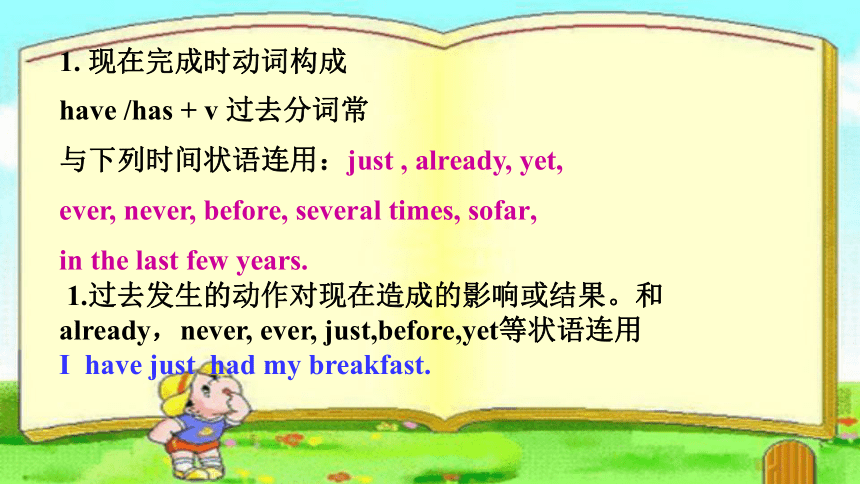中考英语二轮语法专题复习:现在完成时态 课件(共19张PPT)
文档属性
| 名称 | 中考英语二轮语法专题复习:现在完成时态 课件(共19张PPT) |  | |
| 格式 | zip | ||
| 文件大小 | 2.5MB | ||
| 资源类型 | 试卷 | ||
| 版本资源 | 人教新目标(Go for it)版 | ||
| 科目 | 英语 | ||
| 更新时间 | 2021-11-23 07:00:46 | ||
图片预览







文档简介
(共19张PPT)
中考英语二轮专题复习课件
现在完成时
现在完成时:
表示过去发生或已经完成的某一动作对现在造成的影响或结果,或从过去开始一直延续到现在的动作或保存的状态。
结构: 主语+ have / has + 动词的过去分词
一般疑问句: have / has …
Yes, I have. No, I haven’t.
Yes, she has. No, she hasn’t.
聚焦中考
现在完成时:
表示过去发生或已经完成的某一动作对现在造成的影响或结果,或从过去开始一直延续到现在的动作或保存的状态。
结构: 主语+ have / has + 动词的过去分词
一般疑问句: have / has …
Yes, I have. No, I haven’t.
Yes, she has. No, she hasn’t.
聚焦中考
1. 现在完成时动词构成
have /has + v 过去分词常
与下列时间状语连用:just , already, yet,
ever, never, before, several times, sofar,
in the last few years.
1.过去发生的动作对现在造成的影响或结果。和already,never, ever, just,before,yet等状语连用
I have just had my breakfast.
2.过去已经开始,持续到现在的动作或状态,
常与for或since引起的一段时间状语连用。
I have lived here for three years.
I have lived here since three years ago
3.现在完成时把过去的动作和现在的结果联系起来,
一般过去时只限于表示过去的动作本身, 与现在
的结果无关。现在完成时与一般过去时在意义上
的区别举例如下:
I have cleaned my room. (My room is clean now.)
我已经打扫过我的房间了。
I cleaned my room last week. (I did it in the past.)
我上周打扫了我的房间。
Father has gone to Beijing . (He went to Beijing and
he is not here now.) 爸爸已经去厦门了。
They have bought a dictionary. (They bought
a dictionary and they have it now.)
他们买了一本字典。
考点剖析
现在完成时句中常见的时间状语
A.表示从过去一直持续到现在, 不能是具体
的过去时间。
(1).for+表示一段时间的短语
(2).since+表示过去时间点的词语
(3).since+表示过去时间的时间状语从句
eg.I have been a teacher ______ a year.
He has been at this school _______ 1992.
We have learned 1,000 English words _______ we came to this school.
for
since
since
二 选用for和since填空:
1.We haven’t seen each other ______ a long time.
2.His father has been in the factory ______ 10 years ago.
3.The film has been on ______ 20 minutes.
4.Mr Green has worked here ______ he came to China.
5.His grandparents have been dead ______ several years.
6. It’s five years _______ we met last time
练一练
for
since
for
since
for
since
already “已经” ; yet “仍然, 还”
这两个副词常常用于完成时态, 其中already
常用于肯定句, yet常用于否定句和疑问句中。
如: Jim has already finished his work.
Jim已经把他的工作做完了。
Mother hasn’t come home yet. 妈妈还没回来。
Haven’t you read The Call of the Wild yet
你还没读过《野性的呼唤》吗?
考点剖析
have been in, have been to 与have gone to 的用法
(1). Have (has) been in 意为“已经在某地呆了多长时间”,常与表示一段时间的状语连用。
Mr. Brown has been in Shanghai for three days. 布朗先生来上海已经有三天了。
They have been in Canada for five years.
他们到加拿大有五年了。
(2). Have (has) been to 意为“曾经去过某地”,表示现在已经不在那里了。可与 just, ever,
never 等连用。
如:I’ve just been to the post office.
我刚才去邮局了。
Have you ever been to Hangzhou
你曾经去过杭州吗?
Mary has never been to the Great Wall.
玛丽从未去过长城。
(3). Have (has) been to 后面可接次数,
表示去过某地几次。
如:I've been to Beijing three times.
我去过北京三次。
They have been to that village several times.
他们去过那个村庄好几次了。
(4). Have (has) gone to 意为“到某地去了”,表示到了某地或正在去某地的途中。总之,说话时该人不在现场,一般不用第一、二人称代词作主语。
如: —Where is Tom 汤姆在哪里?
—He has gone to the bookshop. 他到书店去了。
一 用have gone to, have been to 或have been in 填空。
1) where’s Jim He ___________ Guilin.
2) She ____________ the park, she will be back in two hours.
3) We have ___________ the bookshop and bought many books.
4) My father ___________ Beijing twice.
5) My parents ___________ Shandong for 10 years.
6) --- Jack, I haven’t seen your brother for a long time.
--- He ____________ shanghai on business for two months.
练一练
have gone to
have gone to
have been to
have been to
have been in
have been in
专项突破
常见非延续性动词和延续性动词的转变
第一类:短暂动词 be + adj.
die finish
open/close fall ill/asleep
marry sb/get married to
第二类:短暂动词 be + 介词.
start/begin
leave
join
练一练
第三类:短暂动词 另一个动词
buy
borrow
become
put on
( )1.---How long have you been like this
---___.
A. Since last month B. Last month ago
C. Last month before D. Last month
A
练一练
( )2.His father ___ the computer for two years.
A. has bought B. has had
C. bought D. have had
( )3.---How long have you_____ the book
---I _________ it since two days ago.
A. borrowed, have borrowed B. keep, have kept
C. kept, have kept D. kept, kept
( )4.We have been good friends since we ___ each other five years ago.
A. knew B. have known C. go to know D. know
B
C
A
Homework
改错
1. I have bought the dictionary half a year ago .
2. His grandpa has died for tow years.
3. Where is Tom
He has been to Guangzhou
https://www.21cnjy.com/help/help_extract.php
中考英语二轮专题复习课件
现在完成时
现在完成时:
表示过去发生或已经完成的某一动作对现在造成的影响或结果,或从过去开始一直延续到现在的动作或保存的状态。
结构: 主语+ have / has + 动词的过去分词
一般疑问句: have / has …
Yes, I have. No, I haven’t.
Yes, she has. No, she hasn’t.
聚焦中考
现在完成时:
表示过去发生或已经完成的某一动作对现在造成的影响或结果,或从过去开始一直延续到现在的动作或保存的状态。
结构: 主语+ have / has + 动词的过去分词
一般疑问句: have / has …
Yes, I have. No, I haven’t.
Yes, she has. No, she hasn’t.
聚焦中考
1. 现在完成时动词构成
have /has + v 过去分词常
与下列时间状语连用:just , already, yet,
ever, never, before, several times, sofar,
in the last few years.
1.过去发生的动作对现在造成的影响或结果。和already,never, ever, just,before,yet等状语连用
I have just had my breakfast.
2.过去已经开始,持续到现在的动作或状态,
常与for或since引起的一段时间状语连用。
I have lived here for three years.
I have lived here since three years ago
3.现在完成时把过去的动作和现在的结果联系起来,
一般过去时只限于表示过去的动作本身, 与现在
的结果无关。现在完成时与一般过去时在意义上
的区别举例如下:
I have cleaned my room. (My room is clean now.)
我已经打扫过我的房间了。
I cleaned my room last week. (I did it in the past.)
我上周打扫了我的房间。
Father has gone to Beijing . (He went to Beijing and
he is not here now.) 爸爸已经去厦门了。
They have bought a dictionary. (They bought
a dictionary and they have it now.)
他们买了一本字典。
考点剖析
现在完成时句中常见的时间状语
A.表示从过去一直持续到现在, 不能是具体
的过去时间。
(1).for+表示一段时间的短语
(2).since+表示过去时间点的词语
(3).since+表示过去时间的时间状语从句
eg.I have been a teacher ______ a year.
He has been at this school _______ 1992.
We have learned 1,000 English words _______ we came to this school.
for
since
since
二 选用for和since填空:
1.We haven’t seen each other ______ a long time.
2.His father has been in the factory ______ 10 years ago.
3.The film has been on ______ 20 minutes.
4.Mr Green has worked here ______ he came to China.
5.His grandparents have been dead ______ several years.
6. It’s five years _______ we met last time
练一练
for
since
for
since
for
since
already “已经” ; yet “仍然, 还”
这两个副词常常用于完成时态, 其中already
常用于肯定句, yet常用于否定句和疑问句中。
如: Jim has already finished his work.
Jim已经把他的工作做完了。
Mother hasn’t come home yet. 妈妈还没回来。
Haven’t you read The Call of the Wild yet
你还没读过《野性的呼唤》吗?
考点剖析
have been in, have been to 与have gone to 的用法
(1). Have (has) been in 意为“已经在某地呆了多长时间”,常与表示一段时间的状语连用。
Mr. Brown has been in Shanghai for three days. 布朗先生来上海已经有三天了。
They have been in Canada for five years.
他们到加拿大有五年了。
(2). Have (has) been to 意为“曾经去过某地”,表示现在已经不在那里了。可与 just, ever,
never 等连用。
如:I’ve just been to the post office.
我刚才去邮局了。
Have you ever been to Hangzhou
你曾经去过杭州吗?
Mary has never been to the Great Wall.
玛丽从未去过长城。
(3). Have (has) been to 后面可接次数,
表示去过某地几次。
如:I've been to Beijing three times.
我去过北京三次。
They have been to that village several times.
他们去过那个村庄好几次了。
(4). Have (has) gone to 意为“到某地去了”,表示到了某地或正在去某地的途中。总之,说话时该人不在现场,一般不用第一、二人称代词作主语。
如: —Where is Tom 汤姆在哪里?
—He has gone to the bookshop. 他到书店去了。
一 用have gone to, have been to 或have been in 填空。
1) where’s Jim He ___________ Guilin.
2) She ____________ the park, she will be back in two hours.
3) We have ___________ the bookshop and bought many books.
4) My father ___________ Beijing twice.
5) My parents ___________ Shandong for 10 years.
6) --- Jack, I haven’t seen your brother for a long time.
--- He ____________ shanghai on business for two months.
练一练
have gone to
have gone to
have been to
have been to
have been in
have been in
专项突破
常见非延续性动词和延续性动词的转变
第一类:短暂动词 be + adj.
die finish
open/close fall ill/asleep
marry sb/get married to
第二类:短暂动词 be + 介词.
start/begin
leave
join
练一练
第三类:短暂动词 另一个动词
buy
borrow
become
put on
( )1.---How long have you been like this
---___.
A. Since last month B. Last month ago
C. Last month before D. Last month
A
练一练
( )2.His father ___ the computer for two years.
A. has bought B. has had
C. bought D. have had
( )3.---How long have you_____ the book
---I _________ it since two days ago.
A. borrowed, have borrowed B. keep, have kept
C. kept, have kept D. kept, kept
( )4.We have been good friends since we ___ each other five years ago.
A. knew B. have known C. go to know D. know
B
C
A
Homework
改错
1. I have bought the dictionary half a year ago .
2. His grandpa has died for tow years.
3. Where is Tom
He has been to Guangzhou
https://www.21cnjy.com/help/help_extract.php
同课章节目录
- 词法
- 名词
- 动词和动词短语
- 动词语态
- 动词时态
- 助动词和情态动词
- 非谓语动词
- 冠词
- 代词
- 数词和量词
- 形容词副词及其比较等级
- 介词和介词短语
- 连词和感叹词
- 构词法
- 相似、相近词比较
- 句法
- 陈述句
- 一般疑问句和否定疑问句
- 特殊疑问句及选择疑问句
- 反意疑问句
- 存在句(There be句型)
- 宾语从句
- 定语从句
- 状语从句
- 主谓一致问题
- 简单句
- 并列句
- 复合句
- 主谓一致
- 主、表语从句
- 名词性从句
- 直接引语和间接引语
- 虚拟语气
- 感叹句
- 强调句
- 倒装句
- 祈使句
- 句子的成分
- 句子的分类
- 题型专区
- 单项选择部分
- 易错题
- 完形填空
- 阅读理解
- 词汇练习
- 听说训练
- 句型转换
- 补全对话
- 短文改错
- 翻译
- 书面表达
- 任务型阅读
- 语法填空
- 其他资料
